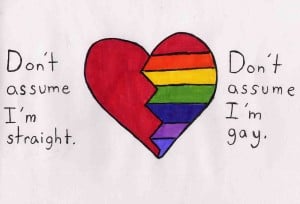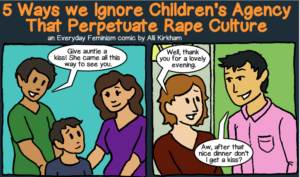
Person sitting in chair with back to the camera while another person in a white coat leans in while appearing concerned
“I’ll defer to your judgment on this one,” I said to my psychiatrist, shrugging.
“You defer to me a lot,” he pointed out, laughing. “You’re allowed to have an opinion.”
I was?
As a mentally ill person, I was so accustomed to having decisions made for me that I was baffled when my new psychiatrist was giving me the final say on my treatment – not just once but consistently.
That’s when I realized: No one ever told me what a good psychiatrist looked like, let alone the kind of treatment I deserve.
And this is nothing short of tragic because the relationship that we have with our psychiatrist can make or break us. When our mental health impacts every aspect of our lives, having a positive and trusting relationship can be the difference between surviving and thriving.
It took seven years of navigating psychiatry to finally find a clinician that I felt safe with. Seven. Years.
This is due, in large part, to the fact that I simply accepted whatever treatment I was given, rather than advocating for myself.
I didn’t know how to recognize when a clinical relationship was working for me, and when it wasn’t – and I was convinced that it didn’t matter as long as I could fill my prescriptions at the end of the day.
But it does matter. And as both a mental health advocate and a patient, I know now that a caring and competent psychiatrist can make a huge difference.
My current psychiatrist is the-bomb-dot-com. And I’ve been reflecting lately on why that’s the case: What exactly does he do differently? And what should we, as mentally ill folks, start to expect from our clinicians?
There are positive signs that I think we should all look out for in our clinical relationships – not just to help us find a good fit, but to give us the language to advocate for ourselves with every psychiatrist that we meet.
Here are seven signs to get you started.
1. They Look at You
When my psychiatrist came out from behind his desk, pulled up a chair across from me, and grabbed his laptop instead of hiding behind his desktop computer, my first thought was, “What the hell is he doing?”
He had a desk and a computer – why did he need to relocate right across from me?
But there was something about his relaxed posture, his complete attention, and most importantly, his consistent eye contact that totally disarmed me.
I immediately felt more trusting of him – something I hadn’t experienced with previous psychiatrists.
My last psychiatrist back in Michigan seldom looked at me, only to greet me and say goodbye. She stared at her computer, rapidly typing as I spoke, saying very little to acknowledge what I had said.
In hindsight, I realize this is why I always found our interactions to be cold and why I always held back on the details when speaking to her.
Something as simple as direct eye contact can change the entire temperature of a room. I went from feeling invisible to being seen.
I can’t emphasize enough what a difference this has made.
2. You Don’t Feel Rushed
In my work as an advocate, the most common complaint I come across is that folks feel their appointments are always cut short, or that they never have enough time to say what they need to.
The pace of the conversation and allotted time ultimately makes them feel like a burden, and they ask fewer questions, share less information, experience significant anxiety, and ultimately receive subpar treatment because they feel rushed.
I realize this varies widely depending on the clinic and clinicians you have access to, but I encourage folks to explore their options as much as possible.
It’s critical that you don’t feel like you’re always running out of time – this can absolutely impact your interactions and treatment.
I’m always blown away by how long my psychiatry appointments are now, and the fact that my psychiatrist always asks at the end if there’s anything else I’d like to talk about, no matter how long the appointment has already been.
We decide together when everything has been said – I’m never pushed out the door.
And if I open a (non-urgent) can of worms right at the end of an appointment, we make another appointment to discuss it, so I’m assured that it will be addressed and I know exactly when it will be.
Check in with yourself during your appointments. Do you feel rushed? Do you feel like you’re always running out of time? If you do, don’t be afraid to mention this.
3. They Respect Your Agency and Give You Choices
When I was struggling with binge drinking, my psychiatrist didn’t tell me what I should and shouldn’t do.
He made a few recommendations about resources that I could choose from, but then went on to tell me he trusted that I knew what I needed.
He believed in my self-determination, and affirmed that I was in charge. He didn’t criticize me for relapsing, or tell me that he knew what was best for me. He gave me choices.
Not once has my psychiatrist made a recommendation for me without giving me other options, and asking me how I felt about the options I was given.
My psychiatrist told me that he strongly believes in collaboration and self-education. In other words, he believes in my agency. I can’t emphasize enough how critical this is for mentally ill folks who – far too often – aren’t trusted to make competent decisions and are talked at rather than talked with.
This approach is both humanizing and, yes, anti-oppressive, as it upholds the belief that mentally ill people are truly the experts on their own lived experience. And we are.
So ask your psychiatrist what the word collaboration means to them in a clinical setting. This is far and away one of the most important signs about what kind of relationship you can expect, and what your treatment might look like.
4. Your Input Is Valued, Not Discouraged
My psychiatrist is always asking me for my opinions and for feedback, encouraging me to be an active participant in my treatment.
And I’m baffled that this isn’t the status quo.
As an advocate, I hear time and time again, “My psychiatrist was annoyed by how many questions I was asking” or “My psychiatrist was bothered by how much I was pushing back.”
Just recently, someone told me that their psychiatrist actually said to them, “You don’t get to call the shots. I do.”
This is a big, ol’ red flag, and you should head for the hills if a psychiatrist ever discourages you from being invested in your own treatment and wellbeing.
A good psychiatrist wants you to stay engaged. A lousy psychiatrist wants you to be seen, not heard, and to swallow your pills dutifully.
Don’t be afraid to seek out a different doctor if you feel that your psychiatrist isn’t listening. Newsflash: A big part of their job is listening – and if they aren’t, they’re failing you as a clinician.
5. There’s Mutual Trust Between You
During my last bout of depression, I sent an online message to my psychiatrist describing how suicidal I was and what plans I had.
I was truly at the end of my rope, and I didn’t know what else to do.
My psychiatrist didn’t call 911, though. He called me.
He calmly checked in with me, convinced me to go to the emergency room, and when I said I was on my way and that my partner was with me, he believed me. He then called the ER, filled them in on my situation, and told them to expect me.
This completely shocked me. But because I had trusted him and shared my suicidal thoughts, he trusted me to do the right thing. And you know what? I did.
I admitted myself voluntarily – which anyone will tell you is preferable to being involuntarily committed and traumatized.
That kind of trust has been critical in my treatment. I feel respected and believed – and in return, I feel that I can open up and be honest about what I’m struggling with.
If you can’t trust your psychiatrist and the treatment they are recommending, how can you sustain the hope that things can and will get better? And how can you confide in them if you’re closing yourself off?
Trust is foundational in any clinical relationship. Do you trust your psychiatrist? If the answer isn’t “yes” or “we’re working on it,” then it may be time to find someone else.
6. They Acknowledge Your Identity and Trauma History
I’m transgender. And I’ve had so many psychiatrists who have pretended this isn’t the case.
Many psychiatrists have ignored the fact that my hormones do impact my mood. And almost every clinician has misgendered me, referred to me as “female,” or asked me questions that were completely inappropriate.
This is shit that I don’t put up with.
Weirdly, my current psychiatrist is the most trans competent psychiatrist I’ve ever had, despite never advertising himself as such.
I also have a significant trauma history, something that I’ve noticed many psychiatrists feel that therapists are exclusively responsible for knowing about in any detail.
But my psychiatrist has been very open to hearing about that history, and taking it into account when diagnosing and making treatment recommendations.
Which is all just to say, if your psychiatrist isn’t interested in the big picture – the aspects of your identity and history that have contributed to your mental health – they may not be a good fit.
If these things are important to you, they should be important to your psychiatrist as well, at least to some extent.
7. They Are Open to Alternative Diagnoses
When I was eighteen, I met with a psychiatrist who accused me of looking for an “easy way out,” being too young for medication, being too dramatic, and who – after all this –shrugged and said to me, “Which pills did you want?”
(I picked Prozac because I saw it on TV. She prescribed it without question or concern.)
She diagnosed me as bipolar after about ten minutes of yelling at me. And that label has followed me around since then, not being challenged or questioned by any of my clinicians until my most recent psychiatrist revisited it.
And guess what. I may not be bipolar after all. Borderline, ADHD, anxiety, OCD – these are labels that I only considered after my most recent psychiatrist had a real conversation with me, and these are labels we continue to revisit and explore.
Diagnoses are markers that can determine the entire course of treatment. Which therapies and medications are recommended can rely on these labels, and how we come to understand our struggles can be framed around these labels as well.
For the last seven years, it’s possible that I was receiving treatment for a disorder I might not even have. This is a huge deal.
This is why it is so incredibly important that we have psychiatrists that don’t take these diagnoses for granted. If something doesn’t feel quite right, don’t be afraid to ask for a reassessment.
If there’s a label that might fit better, don’t be afraid to introduce it to the conversation (because yes, there’s a place for self-diagnosis in psychiatry).
A good psychiatrist is open to new possibilities, and those possibilities can ultimately impact your mental health in big ways.
***
I don’t know at what point I started accepting whatever treatment I got. But I can tell you that now that I’ve had positive psychiatric experiences, I’m unwilling to go back to the days where I was a passive and jaded patient.
I can see the difference a good psychiatrist can make.
The sense of agency, trust, and validation I feel is absolutely priceless – and with each new success, I’m grateful for the amazing clinicians out there who make it a point to respect and uplift us, not perpetuating the harm and abuse that psychiatry can so often enact on mentally ill people.
I expect and demand much more now. And I believe we all should.
[do_widget id=’text-101′]
Sam Dylan Finch is a Contributing Writer at Everyday Feminism. He is a transgender writer, activist, and educator based in the San Francisco Bay Area, exploring the intersections of mental illness and queerness. He is also the founder of Let’s Queer Things Up!, his beautifully queer blog. You can learn more about him here and follow him on Twitter @samdylanfinch. Read his articles here.
Search our 3000+ articles!
Read our articles about:
Our online racial justice training
Used by hundreds of universities, non-profits, and businesses.
Click to learn more




















